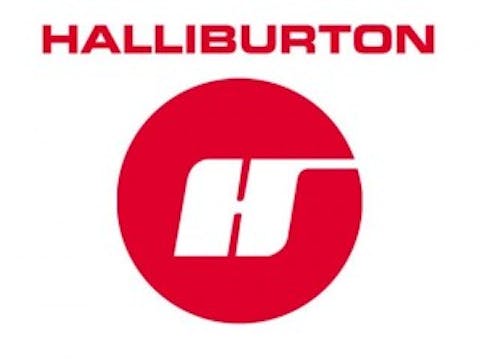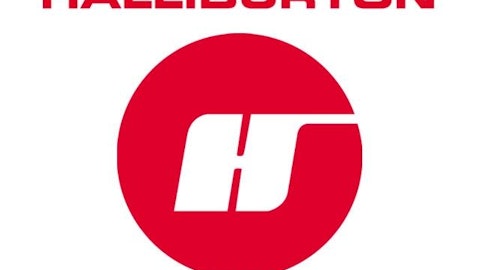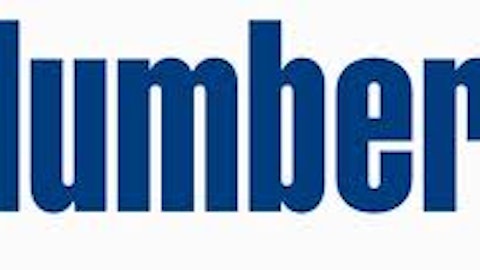It’s been a busy week for Halliburton Company (NYSE:HAL). And at the end, the second largest oil services company seems to have come out trumps. Here is a company whose management knows what it’s doing. The strategy to return cash to investors through share buybacks is proving to be a master stroke.

Halliburton’s corporate headquarters in Houston. Source: Wikimedia commons.
Not the best of weeks …
Starting with the reporting of the second-quarter results, this hasn’t been the most impressive of weeks for Halliburton Company (NYSE:HAL). A flat rig count and lower drilling activity ensured that revenue from the North American segment — the company’s largest market — declined almost 10%, year over year, in the first six months of 2013. To top that, a federal antitrust probe has been initiated targeting the U.S. hydraulic fracturing market, with the top names, including Halliburton Company (NYSE:HAL), coming under investigation.

… but if the business is solid, everything falls in place
However, for all the wrong reasons that the company may have been in the spotlight, Halliburton Company (NYSE:HAL) has been going about its business with quiet confidence. This year, the Houston-based company expanded like never before. Given that the company is an oilfield services provider, management could have solely focused on the lucrative North American unconventional drilling boom. Instead, Halliburton Company (NYSE:HAL) chose to expand its global footprint. And this is where the company is reaping huge benefits.
You might think that Halliburton Company (NYSE:HAL) is still banking on the North American energy boom as a major revenue driver, led by drilling and completion services for shale oil and gas resources. While it’s still the largest market for the company, management has been smart enough not to put all its eggs in one basket. So far this year, international operations have accounted for 48% of total revenue — up from 41% a year ago. This has more than compensated the 10% drop in North American revenues.
The Asian, European and African markets look immensely promising. In the first half of the year, revenue rose 22.4% and 14.7% from the Asia and Europe/Africa segments, respectively. These are the markets investors need to keep an eye on in the future. CEO and President Dave Lesar aptly summed it up in the earnings call: “We will continue to drive toward expanding our global portfolio in deepwater, mature fields, and unconventionals.”
Impressive cash flows
With operations moving ahead impressively, cash flows have received a solid boost. Cash flows from operations have been impressive this year, shooting up 29.6% to $1.47 billion. And instead of reinvesting all of the earnings back into the business, the company chose to reward shareholders through share buybacks.
At the very least, it’s a shrewd and calculated move on management’s part to keep shareholders happy, after all the negative publicity the company has been receiving. At best, this is what I’m looking for in a company with a solid business and sound balance sheet. After repurchasing shares worth $1 billion in the second quarter, the board has authorized another $4 billion in its stock buyback program. Should we ask for more?
Is the stock looking cheap?
To me, Halliburton currently looks cheaper that its bigger cousin Schlumberger Limited. (NYSE:SLB). While Halliburton is trading at 21 times its earnings, and Schlumberger Limited. (NYSE:SLB)’s trading at only 18 times earnings, the reason I’m not too interested in the P/E multiple is that Halliburton’s bottom line doesn’t reveal its actual profits. Since April 2010, the company has been making provisions for its part in the Macondo oil spill disaster. This has distorted Halliburton’s actual earnings considerably.
It’s the price-to-book ratio that looks interesting. At 2.63 — compared with Schlumberger Limited. (NYSE:SLB)’s 2.96 — Halliburton looks cheaper against its accounting value (book value) of equity. In other words, Halliburton Company (NYSE:HAL)’s assets may not be fully valued.
A Foolish takeaway
Halliburton has managed to be in investors’ good graces, thanks to a combination of solid performance and shareholder-friendly management. Foolish investors must keep a hawk’s eye on this stock.
The article Is Halliburton’s Stock a Screaming Buy? originally appeared on Fool.com and is written by Isac Simon.
Fool contributor Isac Simon has no position in any stocks mentioned. The Motley Fool recommends Halliburton.
Copyright © 1995 – 2013 The Motley Fool, LLC. All rights reserved. The Motley Fool has a disclosure policy.




